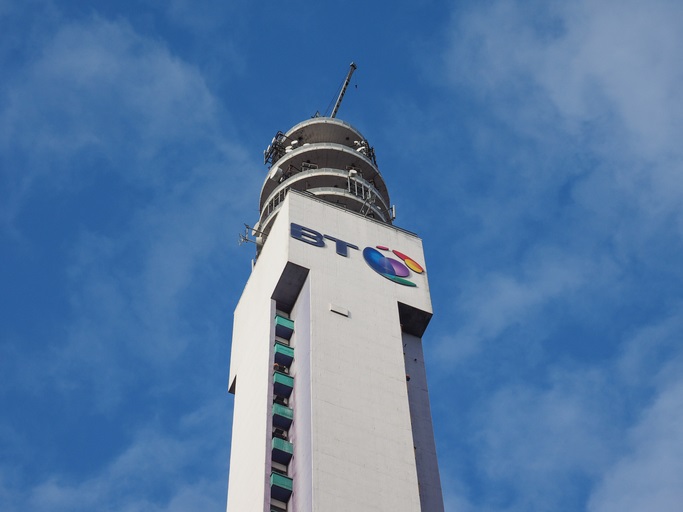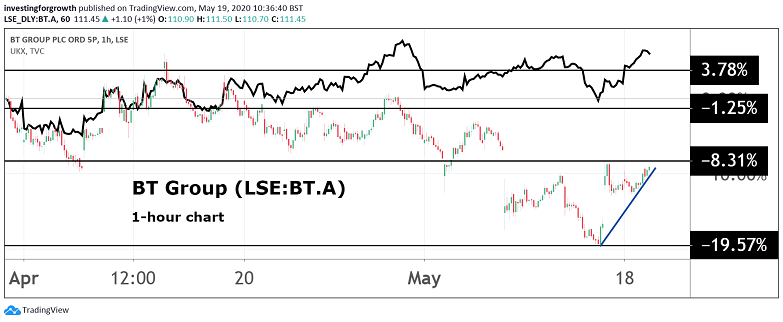Stockwatch: is it finally time to buy BT shares?
Investors should focus on the latent value within BT and not dismiss the Openreach rumour.
19th May 2020 10:48
by Edmond Jackson from interactive investor
Investors should focus on the latent value within BT and not dismiss the Openreach rumour, argues our companies analyst.

What to make of the complex situation that is BT Group (LSE:BT.A)? I drew attention as a ‘buy’ on 20 March following a bounce from 103p to 137p, chiefly on a rationale that the company is well-positioned to capitalise on the growth of home-working as it expands fibre-to-the-premises. Restructuring efforts by the latest CEO should also bear fruit longer-term.
In the short term, the market appeared to trash this: BT’s chart failed to affirm an attempted rebound with the wider market, and instead reverted down below 100p – a low not seen since 2009 – until four directors/associates loaded up with stock.
A story then promptly broke that cited three weeks of talks about selling infrastructure business Openreach, which the market noted by way of re-pricing BT to about 108p.
- Invest with ii: Top UK Shares | Share Prices Today | Open a Trading Account
That rally has now extended to 110p amid a wider global stock market rally. It was then assumed the directors could not have bought unless the story was false; moreover, BT’s CEO Philip Jansen stated that Openreach was “not now” for sale.
But the context/specifics of this story breaking lead me to consider there is more to it.

Source: TradingView. Past performance is not a guide to future performance.
Director buying is likely based on fundamentals
Guidance cited in the 7 May full-year results was for a re-based dividend of 7.7p from 2021/22, after suspension of the payout during the Covid-19 crisis. If achieved, it puts the stock on a relatively attractive yield of around 7%, with the results showing net cash flow from operations up 38% to £6.3 billion.
Mind, that the 149p net asset per share figures you might see in data tables derives 94% from intangibles (after netting off all other assets/liabilities) and a five-year “radical modernisation and simplification programme” is unlikely to be without exceptional costs. Yet the prizes – estimated returns on Fibre to the Premises (FTTP) investment of 10% to 12% and gross annualised savings over £2 billion – are the likely underwriters of dividend policy and behind the CEO’s confidence.
Openreach 'sale' may still be approached intelligently
I suggest the story may well have legs. BT is being very careful with its language, saying the report “contained inaccuracies” but not denying its thrust. The CEO says Openreach is not for sale now, but that leaves open the window for a medium-term (partial) stake-sale, technically up to 49%. That could make sense, helping BT to manage various liabilities and investment needs.
It also demonstrates underlying value within the group, possibly without getting into a regulatory tangle. An outright buyer – for control – certainly is not going to want an immediate Ofcom inquiry.
City estimates of Openreach’s value range from £14 billion to £22 billion, given it constitutes 39% of estimated operating profit for the current financial year to 31 March 2021, which is ahead of BT’s consumer side at 29%, enterprise 24% and global services 8%.
In principle, it hardly seems wise to divest the crown jewels, but, in practice, this may be an enabling move that helps BT deliver on its longer-term prizes. Meanwhile, it has to cope with £12 billion to fund FTTP, £1 billion annual contributions to a pension deficit and £1.3 billion to complete the group restructuring. Cancelling the dividend frees up £2.5 billion.
The net interest charge of £757 million on £18 billion net debt (taking 20% of normalised operating profit) was not especially onerous: BT has an AltmanZ2 score of 1.65 meaning it is not entirely safe from financial distress. It is also not an especially high-risk score, in relative context, though does not reflect BT’s future investment plans.
| BT Group - financial summary | Consensus estimates | ||||||
|---|---|---|---|---|---|---|---|
| year ended 31 Mar | 2014 | 2015 | 2016 | 2017 | 2018 | 2019 | 2020 |
| Turnover (£ million) | 18,287 | 17,968 | 19,012 | 24,062 | 23,723 | ||
| IFRS3 pre-tax profit (£m) | 2,312 | 2,567 | 2,907 | 2,354 | 2,616 | ||
| Normalised pre-tax profit (£m) | 2,592 | 2,923 | 3,255 | 3,034 | 3,296 | 2,912 | 3,297 |
| Operating margin (%) | 17.1 | 19.2 | 19.6 | 15.1 | 16.9 | ||
| IFRS3 earnings/share (p) | 24.5 | 25.1 | 28.2 | 19.1 | 19.1 | ||
| Normalised earnings/share (p) | 25.4 | 29.4 | 31.1 | 25.3 | 25.3 | 27.5 | 27.0 |
| Price/earnings multiple (x) | 9.1 | 8.4 | 8.5 | ||||
| Historic annual average P/E (x) | 15.2 | 15.7 | 13.8 | 11.5 | 8.9 | ||
| Cash flow/share (p) | 53.3 | 52.2 | 53.6 | 55.9 | 57.9 | ||
| Capex/share (p) | 29.9 | 28.7 | 28.2 | 31.4 | 33.6 | ||
| Dividend per share (p) | 9.9 | 11.4 | 12.9 | 14.4 | 14.4 | 15.6 | 15.7 |
| Dividend yield (%) | 6.3 | 6.8 | 6.8 | ||||
| Covered by earnings (x) | 2.7 | 2.6 | 2.5 | 1.8 | 1.7 | 1.8 | 1.7 |
| Net tangible assets per share (p) | -46.5 | -29.7 | -53.6 | -67.2 | -41.8 | ||
| Source: Company REFS | |||||||
Form of the story breaking also lends credence
Unless incredibly well-crafted to fool the Financial Times, it struck me as involving substance: two journalists involved, in London and New York, citing three people with knowledge of discussions over the past three weeks.
An attempted planted story would more likely involve one discreet call to one office. There is also no curious trading before the story broke, or sign of “pump and dump”.
Nor is divesting Openreach a new story. BT has previously resisted approaches, although it has since appointed a new CEO and its liabilities/investment needs are a moving feast.
Remember, restrictions on using Huawei equipment have added to costs just when BT needs to expedite 5G investment for its EE mobile division.
- Chart of the week: is bombed-out BT finally a massive buy?
- A big warning indicator for luckless shareholders
- ii view: BT makes tough decision on dividend
So, while I certainly would not base an investment or trade in BT along such hopes, I take note of this story – also because it may deter short sellers, hence equilibrium in the stock favouring upside. There is no offer for Openreach currently, hence BT’s compliance department was able to sign off the director share trades.
Over decades I have seen trades approved that seemed far more controversial.
Interpreting it shows how you are not necessarily looking for 100% certainty, rather judging what are the probabilities and the effect on market participants. The stock has responded with a circa 10% rise: serious money is not piling in, yet there is acknowledgement of potential.
This looks like a turning point
One can fret about how BT’s near-term chart does not yet affirm a turnaround, and how the new CEO has been piling into the stock even since November 2018, before he took the reins, while telecoms supply is also highly competitive nowadays.
But I reiterate a sense that BT is roughly at a long-term turning point for its operations and equity value. It is a pity the dividend had to be axed, but Covid-19 will also drive long-term returns by way of lifestyle adjustment to more working from home.
BT’s downtrend has lasted from 480p in November 2015 – triggered by an accounting scandal in Italy then profit warning in early 2017 that led to 13,000 job cuts. More positively, its consumer side remains the largest broadband provider in the UK, helped by BT’s legacy of owning landlines, while its international side serving multinational firms has become value-accretive. That said, analysts say the turnaround has been conducted too slowly, enabling smaller fibre operators to evolve. And that is a fair point.
For example, where I live, a community fibre project got going – driven by one resident fed up with particularly slow broadband speeds – which appeared to involve a separate contractor laying cable and residents being requested initially to contract out from BT.
This condition has appeared to relent, although it shows potential damage to BT’s customer base if such 'rebellions' became widespread. Possibly, it explains why BT is now prioritising FTTP, backed also by government policy.
Overall, my sense is that BT shares have potential to climb the 'wall of worry' regarding the company’s challenges, underlined by its directors’ concerted share purchases. The Openreach intrigue is also fending off short sellers for now. Buy.
Edmond Jackson is a freelance contributor and not a direct employee of interactive investor.
These articles are provided for information purposes only. Occasionally, an opinion about whether to buy or sell a specific investment may be provided by third parties. The content is not intended to be a personal recommendation to buy or sell any financial instrument or product, or to adopt any investment strategy as it is not provided based on an assessment of your investing knowledge and experience, your financial situation or your investment objectives. The value of your investments, and the income derived from them, may go down as well as up. You may not get back all the money that you invest. The investments referred to in this article may not be suitable for all investors, and if in doubt, an investor should seek advice from a qualified investment adviser.
Full performance can be found on the company or index summary page on the interactive investor website. Simply click on the company's or index name highlighted in the article.
Disclosure
We use a combination of fundamental and technical analysis in forming our view as to the valuation and prospects of an investment. Where relevant we have set out those particular matters we think are important in the above article, but further detail can be found here.
Please note that our article on this investment should not be considered to be a regular publication.
Details of all recommendations issued by ii during the previous 12-month period can be found here.
ii adheres to a strict code of conduct. Contributors may hold shares or have other interests in companies included in these portfolios, which could create a conflict of interests. Contributors intending to write about any financial instruments in which they have an interest are required to disclose such interest to ii and in the article itself. ii will at all times consider whether such interest impairs the objectivity of the recommendation.
In addition, individuals involved in the production of investment articles are subject to a personal account dealing restriction, which prevents them from placing a transaction in the specified instrument(s) for a period before and for five working days after such publication. This is to avoid personal interests conflicting with the interests of the recipients of those investment articles.